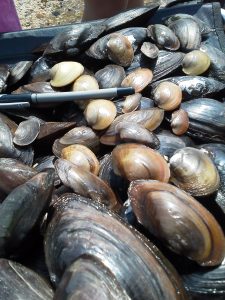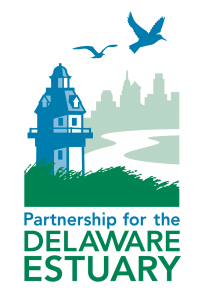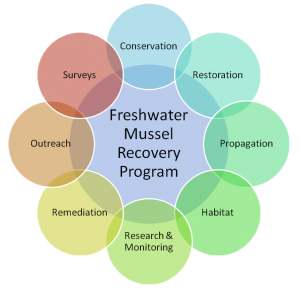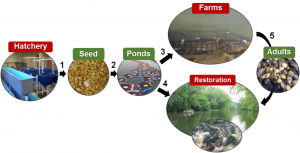Mussels for Clean Water Initiative Fact Sheet
WHAT:
The Mussels for Clean Water Initiative (MuCWI) is part of the multifaceted Freshwater Mussel Recovery Program (FMRP) which aims to restore native species of freshwater mussels to streams, rivers and lakes in the upper mid-Atlantic region, particularly the Delaware River Basin.
Like many other programs across the United States, the FMRP strives to restore mussels because they are one of the most imperiled animal groups. The MuCWI is different because it aims to directly restore or enhance the ecosystem services that are provided by healthy beds of mussels, which are often comprised of both rare and common species. The main goal of MuCWI is to promote cleaner water and healthier aquatic ecosystems via the propagation, rearing and outplanting of mussels created from a central hatchery.
WHY:
A healthy mussel bed can be comprised of thousands to millions of mussels, and each adult mussel can filter more than 10 gallons of water per day. In this process, a mussel bed can remove substantial amounts of microscopic particles, including many forms of pollutants. Increased water clarity provides more light for bottom plants. Some harmful pollutants are transformed into less harmful forms. A robust mussel bed can also help stabilize erosion and improve habitat conditions for many other plants and animals. The decline of natural mussel beds makes it that much harder to sustain water quality and maintain a healthy ecosystem.
HOW:
PDE will work with partners to build a new hatchery and rearing facilities for large-scale mussel propagation. Once mussel seed are produced, they will be used to rebuild natural mussel assemblages. Up to a half million baby mussels will eventually be produced annually. These offspring will be reared to hardier sizes at satellite partner facilities and ponds throughout the region.
Once ready for relocation, some juvenile mussels will be relocated from nursery sites to restoration sites in streams, rivers and lakes. Others can be used to promote clean water in strategic enhancement projects, and some will be used for education and research purposes that support MuCWI goals. The types of mussels raised, project locations, and specific uses will largely depend on priorities set by PDE, MuCWI partners, and funders.
WHERE:
The central hatchery will be located at Bartram’s Gardens in southwest Philadelphia, Pennsylvania. Numerous ponds that are suitable for raising baby mussels have been identified in northern Delaware and southeast Pennsylvania, and more partners with rearing ponds will be sought to expand the scope of MuCWI. The primary geographic focus of MuCWI restoration and enhancement sites will be the Delaware and Susquehanna River Basins, and vicinity, depending on funding.
Other facets of the FMRP will also continue throughout the Delaware River Basin, such as award-winning public outreach and propagation research at the Mussel Hatchery exhibit of the Fairmount Water Works (see MightyMussel.com). Please see the other FMRP web pages for more information on the extent of our scientific and volunteer mussel surveys, bioassessment, and habitat restoration programs.
HOW IS THIS BEING FUNDED?
Generous support to launch MuCWI is being provided by the Pennsylvania Infrastructure Investment Authority (PENNVEST). These funds will be used to construct the mussel hatchery, pond rearing facilities, and initial phases of mussel bed projects aimed at clean water goals. PENNVEST’s investment will be dispersed over an 8-year period. Initial funding will go toward the planning, design, and construction of the hatchery, which could break ground in 2020 at Bartram’s Garden in Philadelphia.
Additional funding is being sought to operate the hatchery, rear baby mussels, and restore natural mussel beds. This additional funding will help define the species of mussel propagated, numbers of mussels produced, and types and locations for restoration projects. Potential funders include private and public grantors that support environmental restoration, water quality enhancement, mitigation of environmental damages, research, and outreach. 
COSTS AND BENEFITS:
Construction and start-up operations are expected to cost between $10-11 million over the eight-year start up, and PENNVEST has authorized $7.9 million for construction phases. The capital return on investment from mussel sales and associated income is expected to be positive. Once fully operational, we anticipate that the demand for MuCWI-produced mussels will at least match the expected annual supply, balancing expected annual operating costs.
Importantly, the MuCWI business model does not account for the value of the beneficial ecosystem services provided by the mussels that are added to our region’s waterways. As pollutant minimization markets become established, such as for nutrient removal, it is plausible that MuCWI operations can also be partly funded by the sale of credits from new best management practices.
WHO:
The Partnership for the Delaware Estuary, a National Estuary Program, will coordinate the MuCWI on behalf of many partner organizations, representing local, state and federal agencies, non-profits, private businesses and landowners, and academia.
SCIENTIFIC REFERENCES
Restoration of Several Native Species of Bivalve Molluscs for Water Quality Improvement in Mid-Atlantic Watersheds by Danielle Kreeger, Catherine M. Gatenby and Peter W. Bergstrom. Journal of Shellfish Research, vol. 37: 1121-1157, 2018.
Kreeger, D. A. & K. Cheng. 2017. Freshwater Mussels, pp. 271-277. In: Technical Report for the Delaware Estuary & Basin 2017. (Haaf, L., S. Demberger, D. Kreeger, and E. Baumbach, Eds.) Partnership for the Delaware Estuary. Report No. 17.07. 255 pp. Available from https://s3.amazonaws.com/delawareestuary/TREB+douments/TREB+2017+complete.pdf
PDE (Partnership for the Delaware Estuary). 2013. A Freshwater Mussel Recovery Strategy for the Delaware Estuary and River Basin. April 2013. 7 p. Available from http://delawareestuary.s3.amazonaws.com/scienceandresearch/scienceprojects/Mussels/freshwater-mussel-strategy-4-9-15.pdf.
Kreeger, D. A. & D. Bushek. 2008. From the headwaters to the coast: a watershed-based perspective on bivalve shellfish restoration. J. Shellfish Res. 27(4):1022.
FMCS (Freshwater Mollusk Conservation Society). 2016. A national strategy for the conservation of native freshwater mollusks. Freshw. Mollusk Biol. Conserv. 19:1-21.


